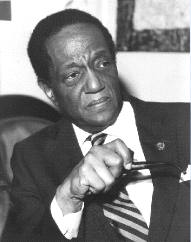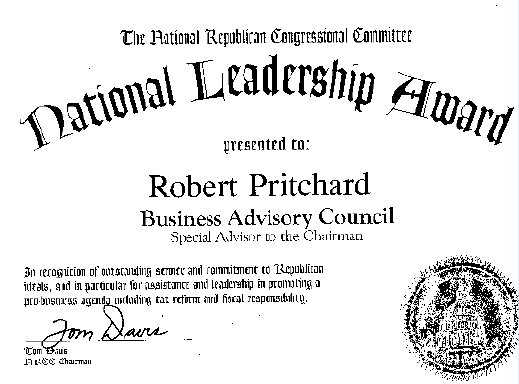|
|
|
 |
 |
 |
| Robert Starling Pritchard has been heralded as history`s first commercially recorded African American virtuoso concert pianist. However, Pritchard is more than simply a pianist. His various multicultural and humanitarian activities throughout the world distinguish him as a true Renaissance man. |
|
| Pritchard was born in Winston-Salem, North Carolina in 1927. Before his birth Pritchard`s mother, Lucille, had a vision that her son would be the first viable African American classical pianist. During her pregnancy, she would frequently place a hand-wound victrola in front of her stomach so that her baby would be infused with spirituals, blues, jazz, and the works of Mozart, Beethoven and Chopin. |
|
| As a young child, Pritchard moved with his family to New York. Along with many other African American families, the Pritchards left the South in search of a better life in the industrial North. Pritchard`s mother ultimately made the decision to leave so that her children would not be raised in the South`s harsh racial climate. The Pritchards settled in Buffalo which, at the time, offered one of the most promising job markets for African Americans. They were unable to find work, however, and moved to Syracuse. Starling, Pritchard`s father, found employment in the city`s burgeoning steel mills. |
|
| In reality, Starling and Lucille Pritchard did not find race relations to be much better in the North than they were in the South. They were also deeply concerned about the education that their children were receiving. Because Pritchard`s public school education was taught from a purely white perspective, his parents would often talk at the dinner table about African American issues and the lives of great African Americans. In order to give their children an understanding of the world beyond Syracuse, the Pritchards often invited international visitors into their home. |
|
| Discovered Musical Virtuosity |
|
| Pritchard was also exposed to music at an early age. He was introduced to the piano by his father. As Pritchard recounted in his 1996 Black History Month speech at SUNY Buffalo, “my father would literally flood the ambiance of our family flat… with disk after disk of victrola performances… beautiful and intellectually stirring solo chamber music and choral masterpieces by Johann Sebastian Bach.” Pritchard credits his father with nurturing his love for music. “It was also from my father that I was daily treated to his own inimitable jazz improvisations on our family`s upright piano,” he remarked in his speech at SUNY Buffalo. |
|
| From and early age, Pritchard`s parents encouraged him to study classical piano. He proved to be a child prodigy and was chosen for private study with pianist Kirk Ridge. Pritchard gave his debut performance with the Syracuse Symphony Orchestra at the age of 15 and also performed in solo recitals. Throughout the 1950s, he studied with renowned musicians such as Carl Friedberg, Robert Goldsand, Hans Neumann, Arturo Benedetti Michelangeli, Edwin Fisher, and Eleanor Amzel. During his undergraduate years at Syracuse University, Pritchard maintained a full teaching schedule, served as choir director and organist for local Syracuse churches, and devoted time to composing his own musical works. |
|
| Launched International Music Career |
|
| In 1957, Pritchard performed as part of the U.S. State Department`s cultural exchange program. He became the first African American concert pianist to tour Europe, the Middle East, and North Africa as a solo performer. As Buffalo News staff writer Carl Allen explained, Pritchard believed he was chosen for the program “partly because he knew little of the conditions the majority of black Americans endured. From what he described as a 'fantasy life` he found himself in the limelight of the Cold War era.” |
|
| During the late 1950s, Pritchard assisted in the creation of music education programs in universities throughout Africa and the Caribbean. In 1959, he established the first music department at the University of Liberia. He also sponsored the opening of the West African Institute of Music, Arts, and Crafts in Monrovia, the capital of Liberia, and served as the first artist-in-residence for the Republic of Liberia. Pritchard and his students also performed piano recitals in order to fund the institute`s programs. Joseph W. Taff, editor of Monrovia`s Daily Listener, remarked to the New York Times that Pritchard “has accomplished more for the cultural advancement and development of Liberia and West Africa than many Trade and Economic Missions who have visited the country.” Pritchard assumed similar responsibilities in Haiti during the late 1950s and contributed to revitalizing the Conservatoire Nationale de Musique d`Haiti. |
|
| Pritchard returned to the United States and, on April 9, 1961, debuted at the New York City Town Hall. His performance earned excellent reviews from music critics. The New York Times reported that Pritchard, “knew how to communicate a sense of musical presence, a feeling for shape, line, phrasing and style. There was the authentic and assured ring of real artistry.” In October of 1962, Pritchard became the first African American to perform at New York City`s Lincoln Center for the Performing Arts, Philharmonic Hall. He dazzled the audience with pieces from Bach, Mendelssohn, Prokofiev, Chopin, as well as his own compositions. That same year, he served as director of the Watermead Concert Series in Pennsylvania and produced his first recording entitled, A Piano Recital. |
|
| During the early 1960s, Pritchard served as a visiting humanities lecturer at both the New School for Social Research in New York and at Barnard College. At the New School, he established the first “for credit` African American studies course offered apart from a historically black college or university. Pritchard also held the position of humanities curriculum specialist at the Palmer Memorial Institute in Sedalia, North Carolina. |
|
| In addition to his work in the United States, Pritchard continued to support the international music community. In 1960, he was commissioned by the Council of Ministers of the Mali Federation to submit a proposal for the establishment of the first Festival Mondial des Arts Negres (First World Festival of Negro Arts). Ultimately, this proposal was implemented in 1966 under the auspices of the government of Senegal and UNESCO. |
|
| Championed African American Heritage |
|
| Following the example set by his parents, Pritchard has chosen to champion his African American heritage. “I realized,” he told the Buffalo News, “that being black in American terms was a stigma. It was something I would carry with me all my life. I had the choice to regard it as a stigma or as a badge of honor… and avoid the consuming hate of racism.” Pritchard has dedicated his life to promoting a multicultural approach to the arts. He has worked diligently to reconstruct the history of African American contributions to classical music. Pritchard has also popularized the works of the 18th-century black Brazilian composers of Rio de Janeiro, who exemplified the music school of “Conservatorio de Negroes.” |
|
| Pritchard was instrumental in the creation of the Gottschalk Inter-American Centenary Observance honoring Louis Moreau Gottschalk, America`s first “Panamerican” concert pianist and one of the first American instrumentalists to receive international acclaim. Held in 1969 on the 100th anniversary of Gottschalk`s death, the Centenary Observance featured an impressive array of concerts and celebrations. Pritchard was honored for his concept, organizational foresight, and administration of the observance by the Secretary-General of the Organization of American States, Galo Plaza. As musicologist Dr. John Godfrey Doyle wrote in the liner notes of Pritchard`s album A Centennial Concert, “it is [due to] Robert Pritchard`s organizational genius that the Gottschalk Centennial was held… Mr. Pritchard has long been a champion of the development of the indigenous cultural resources of ethnic groups of the Americas whose cultural integrity has yet to be acknowledged.” |
|
| Pritchard`s dedication to music is only one manifestation of his greater interest in humanity and the arts. His tours throughout the world convinced Pritchard that people everywhere needed to be enlightened about the legacy of African American culture and history. Pritchard used his musical career, recounted Traci Lucien of Modern Maturity, “as a springboard to bring world-wide attention to black history” in general. |
|
| Remembering local celebrations of African American accomplishments during his childhood in Syracuse, Pritchard worked to expand upon the Negro History Week Observance founded by the distinguished African American scholar Dr. Carter G. Woodson in 1926. His efforts culminated in the national observance of Black History Month, which was first launched in 1965 and is now an annual event. Administered by the Panamerican/Panafrican Association, which Pritchard founded in 1968, Black History Month has not only become a part of school curriculums and institutions in the United States, but also in countries throughout the world. |
|
| Throughout the 1970s and 1980s, Pritchard continued to tour and perform around the world. In 1972, he founded the Pritchard Concert Ensemble and toured throughout Africa. In 1976, Pritchard served as the musical director and pianist for the United Nations Symphonic and Choral Concert Gala. This gala, which commemorated both the 13th anniversary of the founding of the Organization of African Unity and the American Bicentennial, featured the Black Festival of the New World Symphony, the Spelman and Morehouse College Choirs, and the Pritchard Concert Ensemble. The gala also showcased symphonic and choral works by New World composers of African descent. In 1987, Pritchard toured in Korea, China and the Philippines. |
|
| In 1989, Pritchard accepted the position of artist-in-residence at Lincoln University, one of the nation`s oldest institutions of higher learning for African and African American students. While at Lincoln, he established the Pritchard Summer Festival of Music, which showcased the masterpieces of composers-of-color from the Americas, Europe and Africa. Pritchard also coordinated a series of festival master classes, music symposia, and an American Black Writers Conference and served as advisor on cultural affairs to the president of Lincoln University. |
|
| During the 1980s, Pritchard continued to foster cultural understanding both in New York and in his native Syracuse. In 1980, he revived the Impartial Citizen Newspaper, which was originally established in 1848. He also founded the Mayor`s Permanent Conference on Minority Affairs in Syracuse in 1983 and was named co-chairman. The conference served to foster dialogue between elected officials and the public and private sectors on a variety of issues affecting Syracuse`s multi-ethnic communities. These issues included youth and recreation programs, public safety, minority business enterprise, employment, housing, political representation, education, and health. Pritchard also founded the New York State Federation of Minority Media, and was appointed to the New York State Advisory Council on Human Rights by Governor Mario Cuomo in 1984. |
|
| Pritchard also continued to serve the world community. In September of 1991, he was selected as the American cultural advisor to the Ethiopian royal family. In this capacity, he presided over the re-establishment of the Royal Ethiopian Philharmonic, with whom he had appeared as a guest soloist in the early 1960s. |
|
| With his remarkable talent and world vision, Pritchard has touched many lives throughout the world. Despite his struggles with acute intermittent Porphyria, a chronic metabolic disorder, Pritchard remains committed to expanding Black History Month on a global basis. Well-educated, highly-cultured, and driven by global humanitarian aims, Pritchard truly symbolizes the modern Renaissance man. |
|
| Sources |
|
| Periodicals |
| Buffalo News, November 20, 1983, pp. E1, E6. |
| Capital Spotlight, February 26, 1998 |
|
| Hometown News or Progressive Herald (exact citation unknown), November 26, 1950; October 22, 1956; November 29, 1956; July 1, 1959; July 5, 1959; November 17, 1959; March 22, 1966; September 1, 1975; April 13, 1977. |
| New York Herald Tribute, April 10, 1961 |
| New York Times, March 27, 1960; April 10, 1961; September 23, 1962. |
| Washington Post, December 18, 1969. |
|
| Other |
| Additional information for this profile was obtained from Pritchard`s Black History Month speech at SUNY Buffalo in 1996 and from Panamerican-Panafrican Association Press Materials. |
| Lisa S. Weitzman |
 |
|





